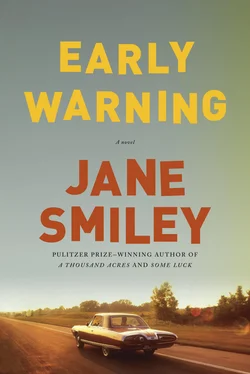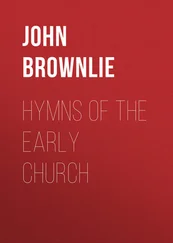Jane Smiley - Early Warning
Здесь есть возможность читать онлайн «Jane Smiley - Early Warning» весь текст электронной книги совершенно бесплатно (целиком полную версию без сокращений). В некоторых случаях можно слушать аудио, скачать через торрент в формате fb2 и присутствует краткое содержание. Год выпуска: 2015, Издательство: Knopf, Жанр: Современная проза, на английском языке. Описание произведения, (предисловие) а так же отзывы посетителей доступны на портале библиотеки ЛибКат.
- Название:Early Warning
- Автор:
- Издательство:Knopf
- Жанр:
- Год:2015
- ISBN:нет данных
- Рейтинг книги:5 / 5. Голосов: 1
-
Избранное:Добавить в избранное
- Отзывы:
-
Ваша оценка:
- 100
- 1
- 2
- 3
- 4
- 5
Early Warning: краткое содержание, описание и аннотация
Предлагаем к чтению аннотацию, описание, краткое содержание или предисловие (зависит от того, что написал сам автор книги «Early Warning»). Если вы не нашли необходимую информацию о книге — напишите в комментариях, мы постараемся отыскать её.
, a national best seller published to rave reviews from coast to coast.
Early Warning — читать онлайн бесплатно полную книгу (весь текст) целиком
Ниже представлен текст книги, разбитый по страницам. Система сохранения места последней прочитанной страницы, позволяет с удобством читать онлайн бесплатно книгу «Early Warning», без необходимости каждый раз заново искать на чём Вы остановились. Поставьте закладку, и сможете в любой момент перейти на страницу, на которой закончили чтение.
Интервал:
Закладка:
“I don’t remember that story,” said Joe.
“Is there a moral?” said Jesse.
“Sometimes it’s easier to pay,” said Frank. “ ‘Do the easier thing’ was always Opa’s moral. He was a happy man.”
Frank did not want to be thanked. What he wanted was just this thing that he was now getting: Jesse laughing at his story, this knowledge that his money had gone for something worthwhile at last, that, against all odds, he was a good man, that happiness could be bought — if not his, then Jesse’s and, yes, Joe’s. Joe and Jesse got into the same car, Jesse driving, and waved as they drove off. Frank stood for another moment or two, not knowing quite where to go for the evening.
1977

AS OLD AS she was and as much as she had seen, Eloise understood politics less and less. How blithely she and Julius had once discussed whether, in America, class was the most important political divide, or race. Julius held out for class — he was a traditionalist, wasn’t he? — and Eloise insisted on race. But neither of them had any idea what they were talking about — they had learned it all from books. In 1920s Chicago, they had been know-it-all tourists, writing articles and tracts extrapolated from the theories of Germans living in England. How was she to think about the Zebra killings, converted Muslim black boys walking around San Francisco, torturing and shooting random white women and old men because they were white and white people were devils? She thought several things, and one of them was, why not, really, given the past and present cruelties that whites perpetrated on blacks? Another of them was, if women were equal to men, then why were their murders more affecting? And another of them was that religion was not just the opiate of the people but an out-and-out poison; and still another was, I hope I don’t get shot walking down Shattuck, thinking about whether I should wash the car. And what was she supposed to think about the Symbionese Liberation Army and Patty Hearst?
Even more current and confusing was Janet and Lucas’s growing attachment to the Peoples Temple. Eloise liked all of these youngsters. Janet, child of the bourgeoisie; Lucas, child of the working class but with artistic aspirations; Cat, child of the lower middle class with hopes of self-betterment; Marla, a beauty, which was a class of its own no matter what Julius would have said. There was also Jorge, whose father had been a doctor in Mexico City, but who had died when Jorge was two, so Jorge had picked vegetables in the Salinas Valley with his cousins until some kind church group put him in school; it turned out he was good at science and math, and so now he was taking pre-med courses at SF State. Someone whom Eloise had only met once was Lena, a runaway from North Dakota, whom the others knew from the Temple. Maybe she was sixteen. She was, apparently, much appreciated for her blond good looks by Reverend Jones. She might be shaping into a full-fledged member of the Lumpenproletariat, but, then, militant feminism asked you to resist categorizing prostitutes as morally suspect merely because they worked in the sex trade. Truly, Eloise was beyond her depth politically, as she suspected Julius, and even Karl Marx, would have been. What she did was offer advice from time to time and hope for the best. What she also did was worry.
She worried because, one visit to the Temple and one look at “Reverend” Jones, and she knew what she was seeing — Joe Stalin from Indiana, the sort of fellow who sucked down a few ideas and then vomited them forth, now irreparably contaminated by the poisons of his very own body. And soul, for that matter, if you believed in souls, which, as a materialist, Eloise did not. It made no difference at all to her that Willie Brown had called the man “a combination of Martin King, Angela Davis, Albert Einstein, and Chairman Mao”—that was campaign bullshit. Or that this kid Jerry Brown sucked up to the fellow, too. Now that they were in office, she thought, they would be running from the Temple fast enough. Jones was crazy and getting crazier, and you didn’t have to be a former member of the CPUSA to perceive that.
Saving Marla was easy: having put off her escape to Paris for a year, in hopes that her two new one-acts would be produced by the Berkeley Rep, Marla just needed a little push. Well, a medium-sized push. She had used most of her savings to produce the two plays at a coffeehouse in Berkeley — no reviews, small audiences, net loss of $487.32. Eloise had liked the plays, both set in a classroom. In the first play, Lucas walked around, drumming on a desk, dancing, drawing, searching here and there, evidently out of control. A teacher’s voiceover gave him increasingly impatient instructions, until, finally, he sat down at his desk and read, resentfully, from an old first-grade reader, with Dick, Jane, and Spot on the cover. But he gave up, slumped slowly to the floor of the stage, and lay there for a long moment as the lights got brighter and brighter. The play was only fifteen minutes long, but Lucas was convincing and affecting in his role. In the second, Marla played herself, as a six-year-old child. It took place in the same classroom, and a short woman, maybe five feet tall, played the teacher. But Marla was perfect as a six-year-old — lolling in her chair, asking in a loud voice to go to the bathroom, interrupting the (imaginary) recitations of the (imaginary) other children, making addition mistakes on the board, sitting on a stool in the corner with a dunce cap on her head. She was so beautiful and elegant as she went through this performance that you really were shocked when the teacher caned her. But apparently, no one in Berkeley was interested in the childhoods of black children as portrayed by a woman playwright. This season, the Rep was doing Shakespeare, Noël Coward, Our Town , yawn.
And so, when Eloise got her tiny little portion of Gary’s sale of her father’s farm — twenty thousand dollars it was — she called Marla up and offered to invest in her French career — do not tell Janet — and she gave her two grand and bought her a one-way ticket to Paris. Marla was grateful but nervous; the only thing she said that was worrisome was that Reverend Jones thought that when nuclear war came, and you could be sure it would, Paris would go up in, not smoke, but radioactive gases. “No,” said Eloise, “it will not. Even Hitler wanted to preserve Paris.” And so she put the girl on the plane, and off she went.
Cat was harder. She had grown up in an all-black town in Texas and moved to California against her parents’ wishes. She had then done a few things she now regretted. But she was devoted to the Temple, and to Jones. She saw herself as Janet’s “sponsor,” and Jones had given her some responsibilities that she took very seriously, including looking after his small children two days a week. Cat was vague about who the mothers of these children were—“We are all their mothers” was what she said, “and Reverend Jones is their father, as he is our father.” When she wasn’t talking about the Temple — who was in and who was out, who was betraying and who was loyal — she loved to talk about cooking and jogging, two of Eloise’s hobbies. Cat also liked Janet very much, and did not like Lucas very much. Eloise could not understand why, but she thought it had something to do with the Temple.
Eloise loved Lucas. Of course, she loved Janet, too — Janet reminded her so much of Rosanna, though her hair was dark and she was five seven, not five two. She had some of Rosanna’s mannerisms: when she had said something she really meant, she stood up straight and flared her nostrils, and she always sat with her knees together and her feet together, never slouching. Eloise, who had spent years refusing to let Rosanna tell her what to do, but admiring her older sister’s looks and self-assurance, was always struck by the resemblance. When Lucas was onstage, she watched the women in the audience staring at him. He was like Cary Grant. There was a being inside of him that was a version of himself; that being was so charming that you could not help being attracted to it, but it had a separate existence from his everyday self. The question Eloise worried about was whether the Stalin from Indiana had noticed the charismatic Lucas, and marked Lucas as a threat or a rival. If so, Eloise thought, Lucas might be in danger, but when she said this aloud to herself, she laughed. Everyone else in town, it seemed, saw Reverend Jones as a powerful force for good in the community. His followers loved him, spoke well of him, reported over and over that their lives had changed under the influence of his loving congregation. They’d found friendship, self-discipline, hope. If they revered him, what was the harm in that? If race was the most important divide in America, then why should Eloise be suspicious of a man who had been more successful than any other in bringing black and white together under one roof, and making them comfortable and accepting of one another?
Читать дальшеИнтервал:
Закладка:
Похожие книги на «Early Warning»
Представляем Вашему вниманию похожие книги на «Early Warning» списком для выбора. Мы отобрали схожую по названию и смыслу литературу в надежде предоставить читателям больше вариантов отыскать новые, интересные, ещё непрочитанные произведения.
Обсуждение, отзывы о книге «Early Warning» и просто собственные мнения читателей. Оставьте ваши комментарии, напишите, что Вы думаете о произведении, его смысле или главных героях. Укажите что конкретно понравилось, а что нет, и почему Вы так считаете.











